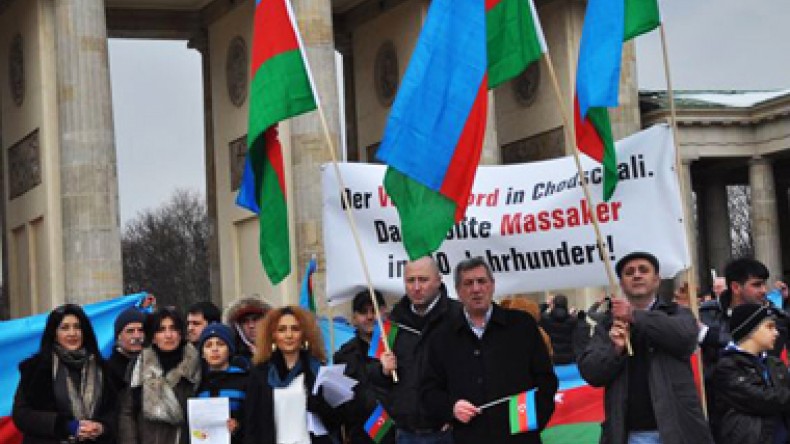
HRW: Azerbaijani authorities crack down on protesters in Berlin pursuiting their relatives in Azerbaijan
Many of Azerbaijani activists who took part in a protest outside the office of German Chancellor Angela Merkel in Berlin during her meeting with President of Azerbaijan Ilham Aliyev, were forced to flee from Azerbaijan being afraid of appearing behind the bars because of their activities. The protesters called on Merkel to focus on human rights issues during talks with Aliyev, but they are unlikely to know that this peaceful protest will have serious consequences for their families in Azerbaijan, writes the Director of the “Human Rights Watch” at Europe and Central Asia Hugh Williamson the on the organization's website.
As the article reports, Tural Sadigli, a 31-year-old blogger, is one of these activists. On February 13 his older brother, Elgiz, 37, who lives in Baku, was arrested and charged with possessing around 1.5 kilograms of marijuana. A day later he was placed in pretrial detention for two months. He could be imprisoned for three years if found guilty. Sadigli is sure that the charges against Elgiz are trumped up, a politically motivated attempt by the authorities to harass and persecute the relatives of government critics living abroad.
Williamson reminds that, Human Rights Watch has documented many cases in Azerbaijan where activists and their relatives are harassed, with the aim of pressing the individuals to halt their activism. And in many cases drugs have been planted on people to provide grounds for bogus criminal charges.
“As Sadigli described it, his brother’s case fits this pattern well. Elgiz was stopped by police in his car. He said that while riding in the police car he felt an officer put something in his pocket—some of the alleged drugs—and although he managed to throw them away, the officers simply repeated the plant in the police station, and also placed drugs in his car. Police also called in for questioning Sadigli’s father, Alovsat Sadigli, 63, and held him overnight. He told Sadigli that police informed him the two detentions were due to his son’s activities in Berlin.”
The article also notes that the relatives of other exiled activists who joined the Berlin protest have also been called in for questioning, according to information gathered by Sadigli. In two cases, relatives have lost their jobs. “For Chancellor Merkel, the consequences of Sadigli’s protest on her doorstep should bring home the scale of the Azerbaijan government’s disregard for human rights,” Williamson notes.
On January 21 in Berlin, German Chancellor Angela Merkel met with President of Azerbaijan Ilham Aliyev. Several human rights organizations heard about the upcoming visit of President Aliyev and made critical statements; in front of the Federal Chancellery a rally was organized in which the participants unfurled banners, raised pictures of political prisoners and the choir chanted in Russian and English languages: "Stop the dictator Aliyev", "For Azerbaijan without political prisoners", "For democratic Azerbaijan without Aliyev", "Stop supporting dictatorial regimes." When the press conference was over, and Merkel with Aliyev began to pose for photographers, one of the journalists jumped up from his seat and started to call on the President of Azerbaijan to release the political prisoners. Chancellor’s Security officers gave him a chance to talk.
Newsfeed
Videos






























